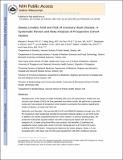| dc.contributor.author | Farvid, Maryam | |
| dc.contributor.author | Ding, Ming | |
| dc.contributor.author | Pan, An | |
| dc.contributor.author | Sun, Qi | |
| dc.contributor.author | Chiuve, Stephanie Elizabeth | |
| dc.contributor.author | Steffen, Lyn M. | |
| dc.contributor.author | Willett, Walter C. | |
| dc.contributor.author | Hu, Frank B. | |
| dc.date.accessioned | 2016-10-06T20:19:04Z | |
| dc.date.issued | 2014 | |
| dc.identifier.citation | Farvid, Maryam S., Ming Ding, An Pan, Qi Sun, Stephanie E. Chiuve, Lyn M. Steffen, Walter C. Willett, and Frank B. Hu. 2014. Dietary linoleic acid and risk of coronary heart disease: A systematic review and meta-analysis of prospective cohort studies. Circulation 130, no. 18: 1568–1578. doi:10.1161/circulationaha.114.010236. | en_US |
| dc.identifier.issn | 0009-7322 | en_US |
| dc.identifier.uri | http://nrs.harvard.edu/urn-3:HUL.InstRepos:28993652 | |
| dc.description.abstract | Background—Previous studies on intake of linoleic acid (LA), the predominant n-6 fatty acid, and coronary heart disease (CHD) risk have generated inconsistent results. We performed a systematic review and meta-analysis of prospective cohort studies to summarize the evidence regarding the relation of dietary LA intake and CHD risk.
Methods and Results—We searched MEDLINE and EMBASE databases through June 2013 for prospective cohort studies that reported the association between dietary LA and CHD events. In addition, we used unpublished data from cohort studies in a previous pooling project. We pooled the multivariate-adjusted relative risk (RR) to compare the highest with the lowest categories of LA intake using fixed-effect meta-analysis. We identified 13 published and unpublished cohort studies with a total of 310 602 individuals and 12 479 total CHD events, including 5882 CHD deaths. When the highest category was compared with the lowest category, dietary LA was associated with a 15% lower risk of CHD events (pooled RR, 0.85; 95% confidence intervals, 0.78–0.92; I2=35.5%) and a 21% lower risk of CHD deaths (pooled RR, 0.79; 95% confidence intervals, 0.71–0.89; I2=0.0%). A 5% of energy increment in LA intake replacing energy from saturated fat intake was associated with a 9% lower risk of CHD events (RR, 0.91; 95% confidence intervals, 0.87–0.96) and a 13% lower risk of CHD deaths (RR, 0.87; 95% confidence intervals, 0.82–0.94).
Conclusions—In prospective observational studies, dietary LA intake is inversely associated with CHD risk in a dose– response manner. These data provide support for current recommendations to replace saturated fat with polyunsaturated fat for primary prevention of CHD. | en_US |
| dc.language.iso | en_US | en_US |
| dc.publisher | Ovid Technologies (Wolters Kluwer Health) | en_US |
| dc.relation.isversionof | doi:10.1161/CIRCULATIONAHA.114.010236 | en_US |
| dc.relation.hasversion | https://www.ncbi.nlm.nih.gov/pmc/articles/PMC4334131/ | en_US |
| dash.license | OAP | |
| dc.subject | cardiovascular disease | en_US |
| dc.subject | coronary disease | en_US |
| dc.subject | diet | en_US |
| dc.subject | linoleic acid | en_US |
| dc.subject | meta-analysis | en_US |
| dc.subject | polyunsaturated fatty acids | en_US |
| dc.subject | saturated fatty acids | en_US |
| dc.title | Dietary linoleic acid and risk of coronary heart disease: A systematic review and meta-analysis of prospective cohort studies | en_US |
| dc.type | Journal Article | en_US |
| dc.description.version | Version of Record | en_US |
| dc.relation.journal | Circulation | en_US |
| dash.depositing.author | Willett, Walter C. | |
| dc.date.available | 2016-10-06T20:19:04Z | |
| dc.identifier.doi | 10.1161/CIRCULATIONAHA.114.010236 | * |
| dash.contributor.affiliated | Pan, An | |
| dash.contributor.affiliated | Chiuve, Stephanie | |
| dash.contributor.affiliated | Farvid, Maryam | |
| dash.contributor.affiliated | Sun, Qi | |
| dash.contributor.affiliated | Hu, Frank | |
| dash.contributor.affiliated | Willett, Walter | |


